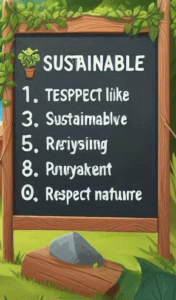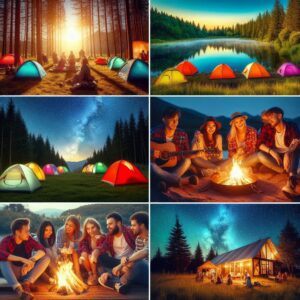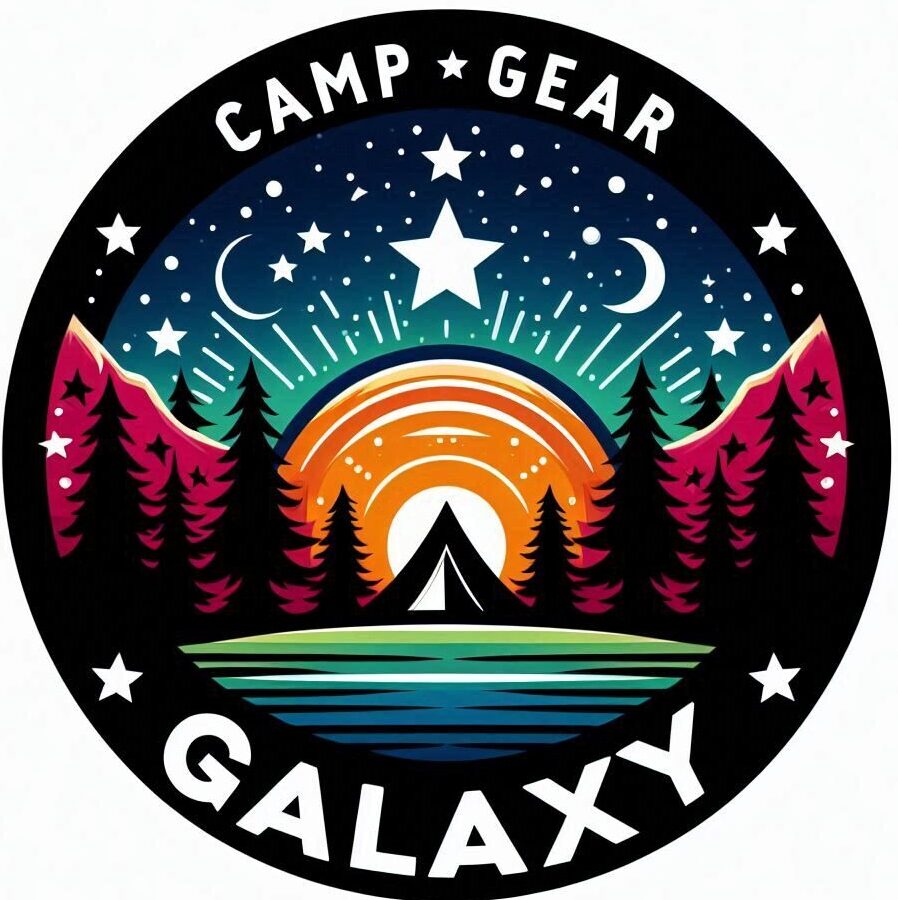
Choosing the right campsite can make or break your first camping experience. It’s important to understand what kind of camping trip you’re aiming for. Are you looking for a rustic escape in nature, or do you want some creature comforts? State parks usually offer more natural settings with basic amenities, whereas private resorts might provide more luxury facilities, like showers and electrical hookups.
It’s a good idea to research what amenities are available at various campgrounds and determine which features are important for your trip. Do you want quick access to hiking trails, or maybe a spot by the water for some fishing or kayaking? Understanding what each location offers ensures you won’t be caught off guard once you arrive.
Location is key when it comes to camping. Consider how far you’re willing to travel, especially for a first trip. Staying closer to home can reduce stress and travel fatigue, letting you focus on enjoying the new experience. Also, look into how accessible the site is, especially if you’re not used to navigating bumpy roads or uneven terrain.
For first-time campers, accessing a site that balances natural beauty with convenience could be beneficial. Pick a location where you can test your gear, adapt to outdoor living, and get a feel for what camping is really like. It might also be a good idea to choose a site with ranger support or staff who can assist you in case you need help.
There’s a lot of great advice out there, but sometimes it helps to hear from other campers. People-first advice such as community reviews and forums can provide real-life insights and tips from those who’ve been there, done that. Many online resources offer interactive guides that help you find the best camping spots based on your preferences and lifestyle.
Essential Gear and Gadgets: Building Your Survival Kit

Getting your gear right is crucial for a successful camping trip. Start by picking the basics: a sturdy tent that can withstand the elements, a sleeping bag suited to the climate, and a comfortable sleeping pad. These form the backbone of your camping setup, ensuring you’re well-rested and ready for adventure.
Choosing the right camping equipment goes beyond just the essentials. Think about what will make your experience more comfortable and safe. A reliable flashlight or headlamp is a must-have for navigating in the dark. Also, consider waterproof clothing and sturdy boots for all-weather readiness.
One thing that’s often overlooked is the importance of a well-stocked first aid kit. Accidents can happen, and having bandages, antiseptics, and any personal medications on hand can prevent minor mishaps from becoming major inconveniences.
In today’s tech-reliant world, a few gadgets can enhance your camping experience. Consider a portable charger for your devices, or a solar-powered lantern that lets you enjoy technology while staying eco-friendly. There are also numerous apps for stargazing, trail mapping, and even for identifying wildlife.
Wild camping, in particular, demands careful planning. The number one rule is to pack essentials responsibly. This means considering the weight and necessity of each item you bring. Remember, everything you take into the wild, you’ll need to carry out too, ensuring you leave no trace on the environment.
Pre-trip Planning: Ensure a Seamless Camping Experience

Before you even load up the car, a solid pre-trip plan is your best bet for a smooth camping adventure. Start by creating a comprehensive camping checklist. Break it down into grouping like gear, clothing, food, and essentials, to ensure you don’t leave anything critical behind.
When it comes to planning your camping trip, the first thing to put on your list is your campsite reservation. Popular sites can fill up fast, especially during peak seasons. Make sure to check if you need any permits as some places require them even for day visits.
Weather can change on a dime, especially in outdoor settings. Checking the forecast ahead of time helps you pack the right gear, but also be ready for sudden shifts by packing layers. A little preparation can prevent a downpour from dampening your spirits.
Another practical step is meal planning. Decide on simple, easy-to-cook meals that won’t require you to bring the entire kitchen. Staff that doesn’t easily spoil is key. Pre-cook or prep as much as you can to save time and reduce cleanup while on site.
Being flexible with your plan will make your trip more enjoyable. Even with the best preparations, things can go wrong. Cultivate a sense of adventure and anticipate some degree of the unexpected. Having a backup plan for activities can make all the difference.
Navigating the Outdoors: Understanding Camp Etiquette

Camp etiquette plays a big role in ensuring everyone enjoys their time outdoors. One of the most important unwritten rules is to respect the natural surroundings. The first rule of camping is to leave the site as you found it, if not cleaner. This includes picking up all trash and making sure you don’t disturb the local flora and fauna.
The ‘leave no trace’ principles are all about protecting the environment. They encourage campers to minimize their impact by staying on trails, disposing of waste properly, and being mindful of campfire policies. Understanding and following these guidelines ensures that the wilderness can be enjoyed by future generations.
Communicating courteously with fellow campers is another key aspect. Whether it’s giving a friendly wave or helping with directions, simple gestures go a long way in creating a pleasant atmosphere. Keeping noise levels down is also considerate, allowing everyone to soak in the tranquility of nature.
Encountering wildlife can be a thrilling part of camping, but safety is paramount. Maintain a safe distance from animals and never feed them. Learning about the local wildlife and what precautions to take can prevent unwanted incidents.
Camping is a communal activity at heart. It brings people together. Engaging with fellow campers, while respecting their privacy, can lead to new friendships and shared experiences. Sharing stories over a campfire or exchanging tips can enhance your camping knowledge and enjoyment.
Mastering Culinary Creativity: Meals Under the Stars

Part of camping’s charm is cooking and dining under the open sky, but it requires some preparation to make sure meals are both satisfying and easy to manage. Planning your meals ahead of time can save you a lot of hassle. Consider recipes that are simple but versatile, such as foil-wrapped dinners or one-pot wonders, which minimize cooking and cleaning time.
Essential cooking gear includes basics like a lightweight camp stove, a set of durable cookware, and utensils designed for easy packing. Don’t forget items like cutting boards and reusable containers to keep everything organized. A cooler that keeps your food fresh is invaluable, especially on longer trips.
Safety and cleanliness are top priorities when setting up your camp kitchen. Always ensure that food is properly stored to keep wildlife at bay, and maintain a clean cooking area to minimize the chance of any unwanted critter visits. This also involves washing your hands and any surfaces often, even when resources are limited.
For a little fun, try incorporating some local ingredients into your meals. This not only enhances your culinary experience but also connects you with the natural environment around you. Whether it’s fresh fish from a nearby lake or wild berries, embracing local flavors can turn meal prep into a memorable part of your adventure.
Cooking outdoors offers a whole new level of culinary experimentation and enjoyment. From savory breakfasts to sweet campfire desserts, the possibilities are endless. And with a bit of creativity, making meals during camping can become just as much of an adventure as hitting the trails.
Crafting Memories: Fun Activities and Exploration

Camping is more than just a retreat; it’s an opportunity to engage with the great outdoors and create lasting memories. One way to do this is by planning a variety of outdoor activities. Hiking is a classic choice, offering scenic views and physical exercise. Make sure to pick trails that match your fitness level, and always let someone know your plans.
Besides hiking, consider try out other adventures like fishing, kayaking, or mountain biking if available in the area. These activities not only provide fun but also bring you closer to nature. Check local guides and maps for the best spots to fully enjoy what the surroundings have to offer.
For those who love to wander, self-guided exploration is a rewarding experience. With a map or using modern navigation tools, you can uncover hidden gems in the area. Just remember to stay on marked paths to protect both the environment and yourself.
Capturing the beauty of your trip is another way to create memories. Photography allows you to document your adventure and share it with others. It’s worth taking a few tips from seasoned photographers on how to best capture landscapes or wildlife without interfering with the natural setting.
Finally, embracing the slower pace of camping gives you a chance to connect with nature on a different level. Consider trying mindfulness practices like meditation or simply enjoying the silence and calm that nature provides. This blend of relaxation and adventure is what makes camping an unforgettable experience.


Hi Greg!
I read your article on planning a first camping trip and found it to be a comprehensive guide for beginners. I especially appreciated the emphasis on researching campsites, packing the right gear, and being mindful of camp etiquette.
As someone who has been camping for years, I would add that it’s also important for first-timers to practice setting up their tent and using their gear before the trip. This can help avoid frustration and ensure a smoother experience once at the campsite.
Additionally, I think it’s worth mentioning the value of camping with more experienced friends or family members who can provide guidance and support. Joining a local outdoor club or attending a beginner’s camping workshop could also boost confidence for those new to camping.
I’m curious to hear from other campers – what tips would you offer to someone planning their first camping trip? What lessons did you learn from your own early camping experiences that could help others start?
Looking forward to a lively discussion and exchanging more ideas to help first-time campers have an amazing adventure in the great outdoors!
Eric
Hi Eric,
I couldn’t agree with you more. Going out with and being near experienced campers is very important. Living in the Pacific Northwest where there is dew every night setting up your tent is key. Probably want a tarp as well, sleeping on a device that keeps you elevated is key, no fun waking up soaking wet.
Wilderness etiquette is not only common sense but should be top of mind. Not using common sense out there leads to situations some are not prepared for. Leaving camp as you found it or even better continues the traditions.
Look forward to hearing from the camper community.
I love how you covered everything from choosing the right gear to planning meals and staying safe. The checklist you provided is super practical and makes the whole process feel way less overwhelming. I also really appreciated the section on preparing for unexpected weather—it’s such an important thing to keep in mind, especially for beginners.
Hello Bob,
Yes, planning for weather events living in the Pacific Northwest is key. We now include fire in that thinking process. It seems like every camping trip there is something you always cant find or misplaced. Through my experience in the woods and life the most important thing all of us must remember common sense. A lot that can get us out there.